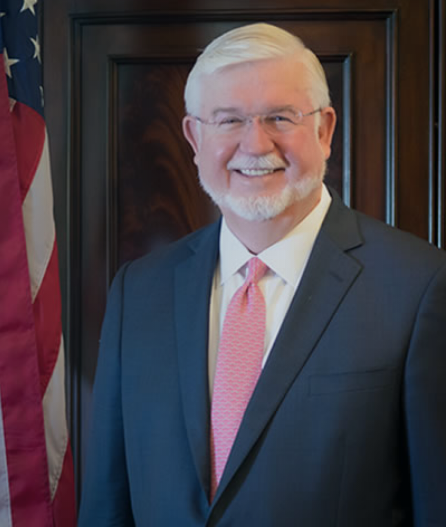You have /5 articles left.
Sign up for a free account or log in.

A. Wayne Johnson
Johnson campaign
A Trump administration official, who until last year oversaw the $1.5 trillion federal student loan portfolio, said Thursday he was stepping down to run for the U.S. Senate as a Republican. And he said his signature issue would be canceling massive amounts of student loan debt.
A. Wayne Johnson was appointed by Education Secretary Betsy DeVos to the top job at the Office of Federal Student Aid in 2017. And since last year, he’s headed initiatives at FSA, including the creation of a mobile student aid app and an overhaul of the student loan repayment system.
But those almost two years in the federal government has convinced Johnson that the student loan system is fundamentally broken.
"We're not going to be able to reform these programs to the extent necessary by regulation. The laws have fundamentally got to be rewritten," he said in an interview. "We do not need to be in the student loan business."
Johnson is seeking the Senate seat held by Georgia Republican Johnny Isakson, who plans to retire at the end of the year. His first campaign proposal is a call for canceling up to $50,000 in student debt for anyone holding federal loans. He also wants to make the same amount available as a grant for students to cover postsecondary education, including workforce training and vocational programs.
“My service in Washington taught me that we need changes in the law to save Americans from going into severe debt just to get a college education,” he said in a statement.
Johnson also said he would push for a tax credit of up to $50,000 for borrowers who already repaid their student debt, an idea that hasn’t appeared in other debt-cancellation proposals. The price tag for the plan would be about $925 billion, according to The Wall Street Journal.
The debt-cancellation proposal is in line with the higher ed platform introduced in April by Senator Elizabeth Warren, the Massachusetts Democrat and candidate for her party's presidential nomination. Warren has called for canceling up to $50,000 in debt for borrowers who earn less than six figures. Her plan also backed free college at four-year and two-year public institutions. It would cost roughly $1.2 trillion.
Senator Bernie Sanders, the Vermont Independent who also is vying for the Democratic presidential nomination, has meanwhile proposed canceling all federal student loan debt.
Whereas Warren said she would use a new wealth tax to fund her plan, and Sanders would tax Wall Street transactions, Johnson said he would impose a 1 percent tax on all employers, including nonprofits.
Johnson said his proposal also differs from the Democrats' plans because it wouldn't base eligibility for student aid on the type of college program. He said Democratic plans would "federalize" higher education by directing Title IV money only to public institutions.
"That's going to disenfranchise a lot of folks," he said.
Julie Margetta Morgan, a fellow at the Roosevelt Institute and former Warren legislative staffer who advised her campaign on debt cancellation, said she hopes other leaders will take a closer look at the policy.
"Wayne Johnson got an inside look at how student loans are hurting borrowers, and he could not deny the evidence: the student loan program is a massive failed experiment that is hurting borrowers and our economy," she said in a statement.
Johnson isn’t the first top official at the Office of Federal Student Aid to make a high profile exit under DeVos. James Runcie, the former FSA chief operating officer, quit in 2017 and blasted the department's leadership in a memo that leaked to the news media.
Before his resignation, DeVos had demanded that Runcie testify in front of the House oversight committee over improper aid payments. That testimony was the source of a dispute between the education secretary and FSA chief. Runcie argued in the memo that there was no need for him to go before the committee. And he also argued that the Education Department under DeVos had pursued projects that "divert critical resources" from federal student aid. He has since launched a nonprofit organization that aims to offer income-share agreements to students who attend four-year colleges.
Unlike Runcie during his departure, Johnson still has high praise for DeVos, who he said is "committed to doing the right thing for students."
That's despite recent comments from DeVos that massive debt-cancellation plans offered by Democrats are "crazy."
After his appointment in 2017, Johnson took over leadership of NextGen, a project to overhaul the platform for servicing student loans and collecting payments.
DeVos sidelined Johnson early last year and put James Manning, a longtime department official, in charge of day-to-day operations at FSA. Johnson headed the new Strategy and Information Office and continued to oversee projects like NextGen as well as the student aid mobile app and a pilot project to disburse federal aid funds to debit cards. Mark A. Brown was named chief operating officer of FSA in March.
Justin Draeger, president and CEO of the National Association of Student Financial Aid Administrators, said Johnson has always been a big-picture thinker on student loans. But he cited practical questions about the kind of overhaul Johnson has proposed.
Ending federal lending could mean many students lose access to higher ed, Draeger said. Johnson argued that his plan would mean students could access grants without having to prove they are low income. And it would allow students to access Pell Grants on top of the $50,000 education grant.
Draeger also questioned the idea that the entire federal loan system is broken.
“I do think there are populations in the system that are definitely in crisis and haven’t garnered enough attention,” Draeger said. “I would take a limited amount of resources and direct them to those populations. Overhauling the entire system by getting the federal government out of student lending -- I don’t see that as necessarily a practical or viable solution.”




